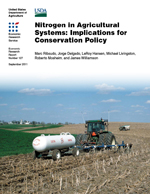Nitrogen in Agricultural Systems: Implications for Conservation Policy
by
Marc Ribaudo, Jorge Delgado,
LeRoy Hansen,
Michael Livingston,
Roberto Mosheim, and
James WilliamsonEconomic Research Report No. (ERR-127) 89 pp, September 2011
 Nitrogen is an important agricultural input that is critical for crop production. However, the introduction of large amounts of nitrogen into the environment has a number of undesirable impacts on water, terrestrial, and atmospheric resources. This report explores the use of nitrogen in U.S. agriculture and assesses changes in nutrient management by farmers that may improve nitrogen use efficiency. It also reviews a number of policy approaches for improving nitrogen management and identifies issues affecting their potential performance. Findings reveal that about two-thirds of U.S. cropland is not meeting three criteria for good nitrogen management related to the rate, timing, and method of application. Several policy approaches, including financial incentives, nitrogen management as a condition of farm program eligibility, and regulation, could induce farmers to improve their nitrogen management and reduce nitrogen losses to the environment.
Nitrogen is an important agricultural input that is critical for crop production. However, the introduction of large amounts of nitrogen into the environment has a number of undesirable impacts on water, terrestrial, and atmospheric resources. This report explores the use of nitrogen in U.S. agriculture and assesses changes in nutrient management by farmers that may improve nitrogen use efficiency. It also reviews a number of policy approaches for improving nitrogen management and identifies issues affecting their potential performance. Findings reveal that about two-thirds of U.S. cropland is not meeting three criteria for good nitrogen management related to the rate, timing, and method of application. Several policy approaches, including financial incentives, nitrogen management as a condition of farm program eligibility, and regulation, could induce farmers to improve their nitrogen management and reduce nitrogen losses to the environment.
Keywords: Reactive nitrogen, nitrogen management, fertilizer, water quality, greenhouse gas, economic incentives, conservation policy, regulation
In this publication...
Charts and graphs (in .png format) from this report are available in the .zip file listed below. The .zip file also contains a document (readme.txt) that lists the name and title of each chart or graph file.
Need help with PDFs?
Order this Publication